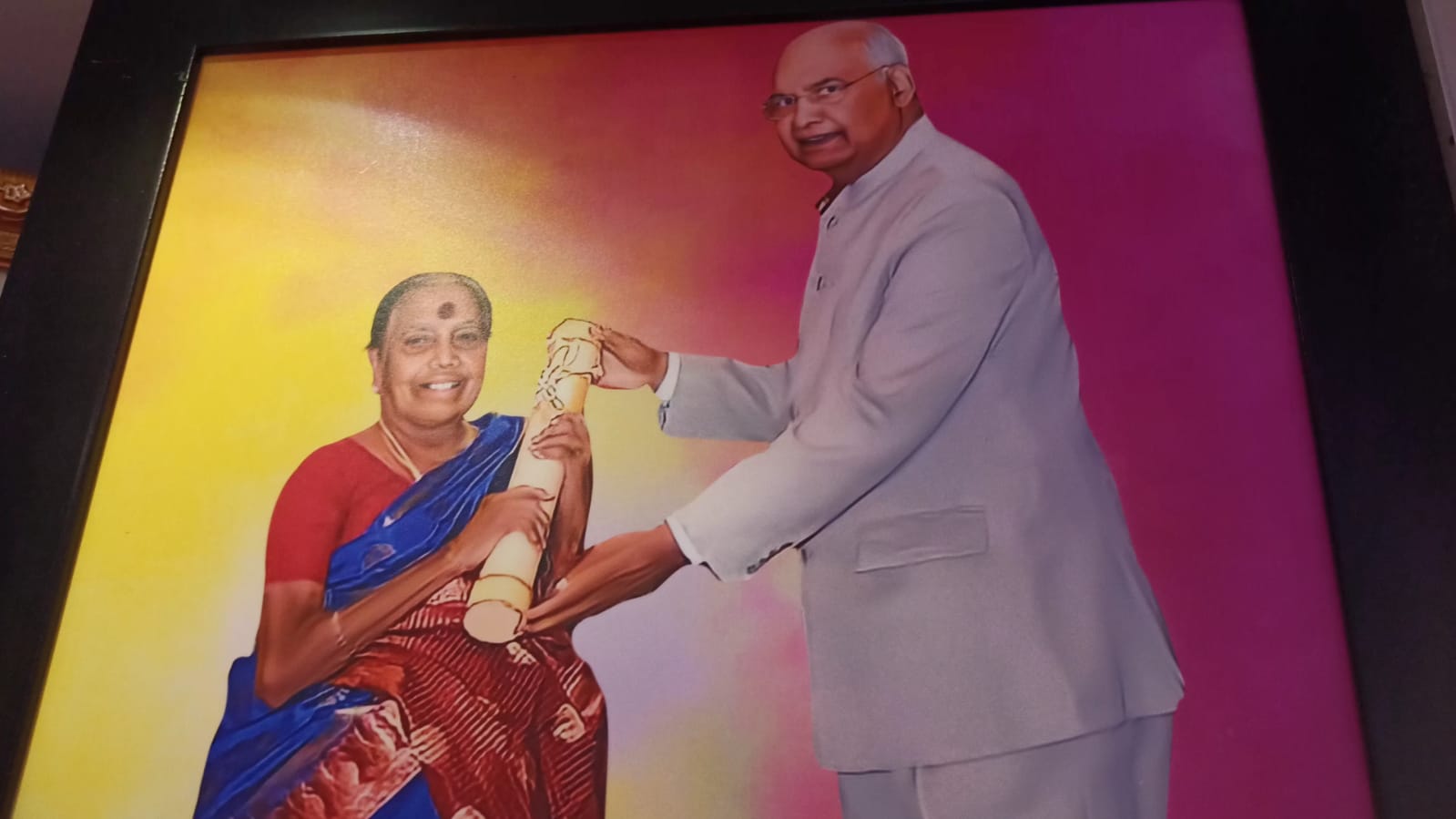Despite the fact that Devadasis were forbidden from getting married, Muthukannammal had a life partner who fell in love with her after seeing her perform.
Muthukannammal, a resident of Viralimalai in Tamil Nadu’s Pudukkottai district, was conferred the Padma Shri last year, the highest honor bestowed in the field of arts.
Pudukkottai: Devadasis or Devaradiyars are the terms used to describe girls who are assigned to serve at temples at early age. They had mastered the art of singing and dancing to God as temple workers. The primary musical tradition in Tamil Nadu was led by the Devadasis, whose dancing style was referred to as Sathir and Dasi Attam.
During the festivals, the Devadasis performed Sathir dance to amuse the worshippers while they worship the Gods. In this manner, Muthukannammal was the one ‘dedicated’ in the Viralimalai Subramaniaswami temple for Lord Murugan. The 85-year-old Muthukannammal is currently the final heir of the Devadasi dynasty and was one of the 32 Devaradiyars recognized in the Pudukkottai princely realm.
Muthukannammal, a resident of Viralimalai in Tamil Nadu’s Pudukkottai district, was conferred the Padma Shri last year, the highest honor bestowed in the field of arts. “My entire family is ‘Sathirattam’ (Sathir dancers) family. I didn’t shout Sathir dance in a formal way until I heard it from my father Ramachandhran Nattuvanar. He’s also my mentor,” Muthukannammal said. Further, “As far as Viralimalai is concerned, mostly our family dances Sathir. I started playing Sathir when I was 7 years old. At the time, including myself, a total of 32 people had served the temple. It was our father who taught Sathir to all 32 people,” Muthukannammal added.
“Our task is to climb and descend 400 steps every morning and evening to worship Subramaniaswami, sing songs and dance Sathir. Eventually, at temple celebrations, we predominately perform Sathir. Back then, there were no lights like now. Only Petromax light, yet witty. However, Sathir, Kummi and Kolattam are so wonderful to watch,” Muthukannammal recalled. According to her, they were given all the amenities and privileges that they required by Pudukkottai Maharaja Rajagopala Thondaiman, who was in charge of the Viralimalai temple at the time and the community reportedly honored them as well.
Meanwhile, Muthukannammal added, “When it comes to singing, and dancing, Sathir is also quite nuanced, while we got a sizable crowd to watch us perform. Bharatanatyam has replaced Sathir in our current game. Our lives have changed significantly since gaining our Independence and it was stated that dancing Sathir was prohibited in temples. Subsequently, the Maharaja’s rule came to an end as well,” she said.
“We don’t perform Sathir in the temple thereafter. However, a few folks who knew about this art came up to me and requested to teach them. In that way, I tutored actor Swarnamalya. Also, some came from Karnataka and learned this art from me,” Muthukannammal stated with pride.
Despite the fact that Devadasis were forbidden from getting married, Muthukannammal had a life partner who fell in love with her after seeing her perform. She had a single demand in mind for him to consider moving in with her- she was not going to stop dancing. As Muthukannammal was no longer able to dance at the Viralimalai temple, she raised her children by grinding rice with an ‘Aatu Kallu’, which translates to hand grinder in English. Additionally, Kalamshu Art Award and Dakshina Chitra Award are some of the several accolades that Muthukannammal had received.
(With inputs from Sneha Vijayan)


























